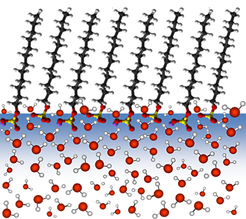Energy exchange between surface water molecules
The way in which water molecules exchange energy at boundary surfaces was recognized by Ruth Livingstone, a scientist at the Max Planck Institute for Polymer Research. For this she was awarded the Poster Prize at the "Gordon Research Conference on the Chemistry and Physics of Liquids” which took place from the 4th to the 9th of August 2013 in Holderness, New Hampshire (USA).

Livingstone’s research interests concentrate on water molecules and their behavior at surfaces. Water molecules can act quite differently depending on their surroundings; the processes that take place at the interface between water and air can be different from those in the liquid itself. If a further substance is added, for instance a surfactant coating the water surface, an interface made up of water, surfactant and air is obtained in which the H2O molecules move.

Ruth Livingstone observed successfully how the water molecules exchange energy over the material boundaries. To observe these processes an experimental setup is required to meet the particular challenge of initiating controlled, repeatable processes in order to differentiate the surface molecules from the rest of the water. The physicist uses vibrational sum frequency generation spectroscopy (SFG) to meet these requirements. The water molecules are excited at the interface by a laser pulse in the infrared range and begin to vibrate. Two other laser pulses in the visible and infrared light ranges are radiated onto the sample at a slightly delayed time. These second two frequencies add up to create the resulting signal. Vibrational resonances of molecules can be detected in the spectrum, but only at interfaces. Livingstone was able to prove that water molecules at the interface to the surfactant passed their absorbed energy directly onto the water particles in the surfactant. This phenomenon raises numerous further questions which the Scot wishes to comprehend in the future.
Ruth Livingstone has a PhD from Heriot Watt University in Edinburgh and has been working in the group of director Mischa Bonn at the MPI-P since 2012. She has recently been awarded a Humboldt Research Fellowship in order to expand upon this work.













